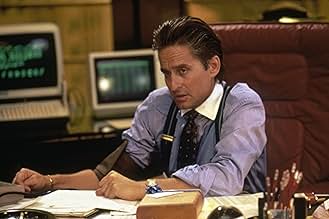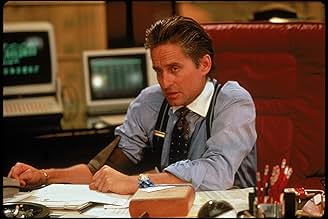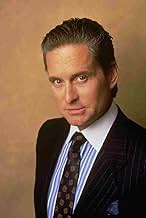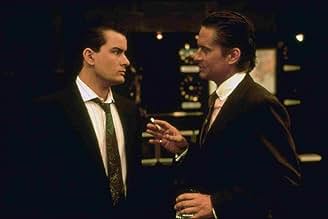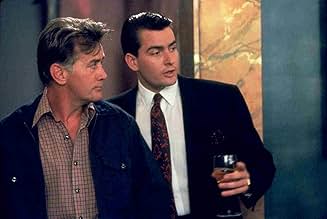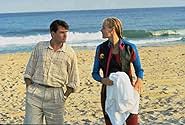Wall Street
- 1987
- Tous publics
- 2h 6min
Un courtier en bourse jeune et impétueux est prêt à tout pour arriver au sommet, même en réalisant des opérations financières à partir d'informations d'initié obtenues illégalement d'un raid... Tout lireUn courtier en bourse jeune et impétueux est prêt à tout pour arriver au sommet, même en réalisant des opérations financières à partir d'informations d'initié obtenues illégalement d'un raider financier impitoyable et cupide qui prend le jeune sous son aile.Un courtier en bourse jeune et impétueux est prêt à tout pour arriver au sommet, même en réalisant des opérations financières à partir d'informations d'initié obtenues illégalement d'un raider financier impitoyable et cupide qui prend le jeune sous son aile.
- Réalisation
- Scénario
- Casting principal
- Récompensé par 1 Oscar
- 9 victoires et 4 nominations au total
- Chuckie
- (as Chuck Pfeifer)
Avis à la une
The characters are interesting and richly developed, with the exception of Darryl Hannah's underwritten character. I can see why she didn't like playing that role. Douglas is always a joy to watch, and makes a suave yet slimy villain. I wouldn't necessarily say he deserved an Oscar, but he did a fine job nonetheless. So did Charlie Sheen, who is actually the star of the film despite the fact that most people remember "Wall Street" for Douglas as Gordon Gecko. Sheen gives a fine multi-dimensional performance. I love the scenes between him and his father Martin Sheen, who plays his father in the film. Oliver Stone made a great choice casting the father-and-son team, since the tension in their scenes feels very authentic.
There are some predictable plot turns and character arcs, but altogether Stone keeps the excitement going. I like how the climactic scene between Douglas and Sheen is shot without cuts, with the camera moving from person to person, keeping the tension going. If I knew at least an inkling about the stock market, I wouldn't be completely lost during certain scenes, but what can you do? I still think it's a fine film with solid performances.
My score: 7 (out of 10)
Many people associate this film with a liberal versus conservative viewpoint on business, a wild-west economy versus a planned economy and relegate this film to 1980's era nostalgia, like the now humorously giant cell phone Gekko is talking on as he walks along the beach. It is said that neither extreme works and that we've gradually settled towards something in the middle. However, the Gekkos of this world are smarter than that, and over the past 20 plus years they have set up an economic system that serves them well. What we now have is a situation where the haves and have-mores have a planned - almost Soviet - system in which the rules stratify them at the top. I cite the changes in bankruptcy law as exhibit A. The members of the labor force that serve them, however, are in the wild-west economy that was once advocated for everyone. Some will rise to the stratified top in this situation, but the vast majority will remain at the bottom shooting it out with each other - for scarce good jobs, good health care, education, etc. Thus, to me, Wall Street is just an opening chapter in the saga of how economic forces and attitudes toward them have changed, not the portrait of a 25 year-old fad that has come and gone.
Gekko is a villain and an outlaw, but mostly he comes across to viewers as a worldly tough guy, a charming bully with a glamorous lifestyle. We see his high-class mega-office, his plush home and chic wife, his expensive paintings, his rapid-fire commands to his robotic lieutenants, his snazzy clothes and "in vogue" friends. Here and there we see his frustrations, but that only accentuates his toughness. We do not see him suffer, nor do we see the consequences of his selfish, Machiavellian behavior.
As a result, to viewers, especially to those youthful, bright, materialistic Americans with a smug, "can do" attitude, and disdain for ethics, Gekko is, unfortunately, someone to admire, a Wall Street role model.
The film follows a low level day trader (Charlie Sheen) who strives to become a very powerful figure on Wall Street like his idol Gordon Geckko (Michael Douglas). To justify his rise to power, he uses his father (Martin Sheen) knowledge of the flight industry for his own personnel gains. He wants to get his foot into the door of the oily Geckko. Will he sell his soul for a quick buck? How far and fast will this rising star soar? To find these answers check out Wall Street.
This film was made immediately after Platoon. Stone made it clear that he wasn't going to let an Oscar winning malaise effect him. He explores the two fathers theme that he used in Platton and once again makes it work. A highly underrated film that has sadly been neglected by the mainstream audience. What makes it even sadder is the fact that it still applies today.
Highly recommended.
Le saviez-vous
- AnecdotesIn the scene in which Bud Fox brings a birthday gift to Gekko's office, Gordon's secretary says 'Five minutes' in order to keep the unplanned meeting between Gekko and Fox as brief as possible. There are exactly 5 minutes in the movie from this moment to the moment in which Bud leaves the office.
- GaffesAt the beginning of the movie, Bud Fox and Marvin say Gordon Gekko was shorting NASA stock right after the Challenger explosion. The scene is set in 1985, but the Space Shuttle Challenger exploded January 28, 1986.
- Citations
Gordon Gekko: The richest one percent of this country owns half our country's wealth, five trillion dollars. One third of that comes from hard work, two thirds comes from inheritance, interest on interest accumulating to widows and idiot sons and what I do, stock and real estate speculation. It's bullshit. You got ninety percent of the American public out there with little or no net worth. I create nothing. I own. We make the rules, pal. The news, war, peace, famine, upheaval, the price per paper clip. We pick that rabbit out of the hat while everybody sits out there wondering how the hell we did it. Now you're not naive enough to think we're living in a democracy, are you buddy? It's the free market. And you're a part of it. You've got that killer instinct. Stick around pal, I've still got a lot to teach you.
- Crédits fousBuilding illustrations are shown during entire end credits
- Versions alternativesIn the VHS release, instead of the correct 1981-1994 20th Century Fox logo, the 1953-1981 logo is used.
- Bandes originalesFly Me to the Moon
Words and Music by Bart Howard (ASCAP)
Published by The Hampshire House Publishing Corp. (ASCAP)
Performed by Frank Sinatra
Courtesy of Reprise Records
By Arrangement with Warner Special Products
Arrangement by Quincy Jones (uncredited)
Meilleurs choix
Détails
- Date de sortie
- Pays d’origine
- Site officiel
- Langue
- Aussi connu sous le nom de
- El poder y la avaricia
- Lieux de tournage
- 60 W. 75th St, Ville de New York, New York, États-Unis(Bud's first apartment building)
- Sociétés de production
- Voir plus de crédits d'entreprise sur IMDbPro
Box-office
- Budget
- 15 000 000 $US (estimé)
- Montant brut aux États-Unis et au Canada
- 43 848 069 $US
- Week-end de sortie aux États-Unis et au Canada
- 4 104 611 $US
- 13 déc. 1987
- Montant brut mondial
- 43 848 069 $US
- Durée2 heures 6 minutes
- Couleur
- Mixage
- Rapport de forme
- 1.85 : 1
Contribuer à cette page





